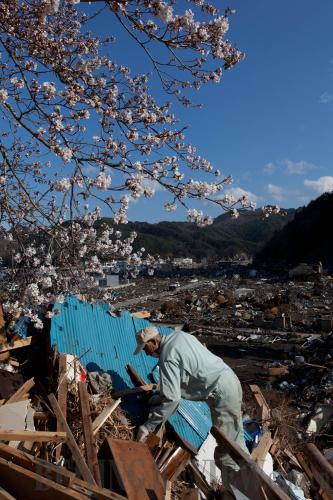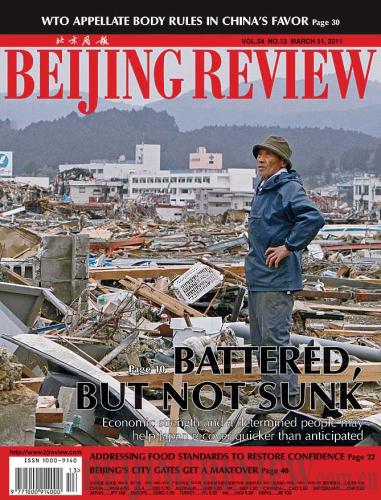|
 |
|
RECOVERING: On April 16, a Japanese man looks for useful materials left by the March 11 earthquake to rebuild his home in Iwate Prefecture (XINHUA/AFP) |
 |
|
Click cover for more |
Beijing Review's cover story, Battered, But Not Sunk, issue No.13, 2011, analyzed the influence of the 9.0-magnitude earthquake of March 11 on Japan's and the world's economy and delivered a positive message of hope that Japan would realize economic recovery as soon as possible. The report was well received by our Japanese readers, and they had this to say:
Kenichi Okamoto (an employee at a mechanical and auto part manufacturer in Tokushima)
A lot of media say this earthquake was the most disastrous calamity the world has ever seen. Beijing Review's reports are interviews with individuals and this has an influence TV media cannot achieve. Yours is a fresh style and the angle is out of the ordinary. This makes you stand out from others.
Generally speaking, massive reports follow hard on the heels of earthquakes, but gradually relevant reports diminish. Beijing Review not only paid attention to the quake's influence on people's lives but also the psychological changes in people in Japan and other countries. What I want to say is that, your reports are different from those of other media, such as TV, which normally deal with big events. You focused on ordinary people's lives, and this makes us feel more noticed.
Makoto Kawanabe (a restaurant manager in Kagoshima)
Beijing Review produced an objective and accurate report of the Japanese behavior as well as the social and economic order following the massive earthquake. The report said the Japanese people's stoicism and their high level of social morality would help them to deal with such a big catastrophe with extremely strong resilience and solidarity. Because of this massive earthquake, the Japanese people's calmness and high moral standards have become well-known around the world.
Of course, for the Japanese people, what's more important is the spirit of mutual help woken by this earthquake—a spirit they should have always cherished but unfortunately had almost forgotten.
The Japanese people's responses and behavior should be attributed to the disaster education which starts early in people's lives, because Japan is a country frequently hit by earthquakes. If this earthquake can raise the whole world's disaster crisis management awareness, and your reports are able to remind every reader of the importance of crisis management in disasters, it will be a good thing.Your reports also mentioned how the Naoto Kan administration would deal with the current situation. Indeed, leading Japan toward revitalization is a test for Japan's current leadership.
Finally, you also mentioned Japan's reconstruction and economic revitalization. Through your articles, I can feel your sincerity regarding Japan's disaster relief. This brings the Japanese people courage and hope. Here, I'd like to thank the rest of the world for its assistance to Japan.
Hajime Miyoshi (a restaurant owner in Tokyo)
The Japanese people and their country are undergoing testing times posed by a series of unprecedented disasters—earthquake, tsunami and nuclear power station accidents. I think the article Overcoming a Cataclysm made a calm and objective explanation of this point. Several stories of individuals in this earthquake show—even if they have been hit by such a cataclysm—the Japanese are still able to keep calm and maintain order. This story truly reflects this rare and precious nature of the Japanese nation.
The writers of relevant articles in this issue not only made objective reports, but also put forward optimistic attitude about Japan's future recovery, based on Japan's revitalization after the Hanshin-Awaji earthquake and Japan's economic strength. This is a very persuasive view. Your reports not only bring hope to the Japanese, but also kindle hope for foreigners who are worried about Japan's possible long-term economic depression. | 